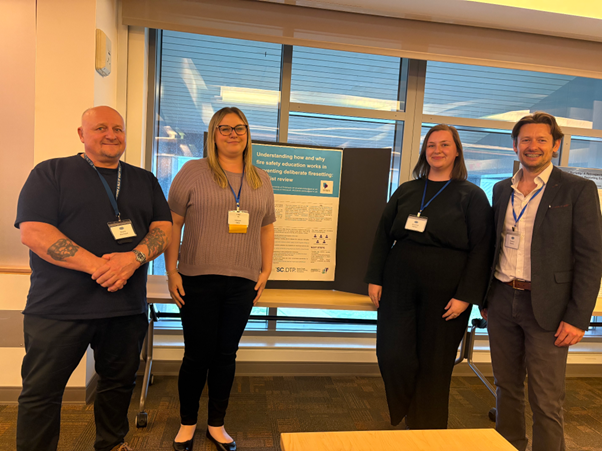Date: 01/07/2025
Author: Charlotte Emily Booker, University of Portsmouth

Charlotte Booker
Bio:
Charlotte is a second-year ESRC-funded SCDTP PhD Researcher at the University of Portsmouth, based in the School of Psychology, Sport and Health Sciences.
Her research investigates how fire safety education may lead to behaviour change for adults convicted of deliberate firesetting.
Charlotte is also an active member of the International Centre for Research in Forensic Psychology (ICRFP) and the Firesetters’ Integrative Responsive Educational Programme (FIRE-P) partnership group.
About IFIRE and its Mission
IFIRE stands for International Association of Firesetting Intervention Research and Education. It is an organisation that “promotes sound research on the causes and costs of misuses of fire, educates the public and policy makers, and provides professional development training and cross-training on prevention, assessment, and intervention strategies to reduce misuse of fire” (William James College, 2025). Members of IFIRE are located globally and span across several disciplines and professions including the fire service, mental health, law enforcement, social services and education professionals. The multidisciplinarity of IFIRE was certainly reflected in the selected speakers.
Conference Overview
The 2025 IFIRE Conference, titled International Perspectives on Child and Adult Firesetting: Advances in Research and Practice, was not only IFIRE’s first event, but also the first conference of its kind. The conference featured four plenary talks, exhibitions and a variety of workshops to choose from (deciding which workshops to attend was a challenge!). I contributed a poster presentation detailing my ongoing review on how and why fire safety education can prevent further deliberate firesetting amongst adults, young people and children (see below).

Shane Blampied (stakeholder), Dr Nichola Tyler (stakeholder), Charlotte Booker, Dr Dominic Pearson (first supervisor).
Plenary Highlights
The conference kicked off with a plenary by Rachael Utumapu, from Fire and Emergency NZ, who took us through the journey of how the Fire Awareness Intervention Programme (FAIP) became Ahikura Whānau-Centred Fire Education. Following an evaluation of FAIP, the intervention was reborn to enhance local awareness of the programme, practitioner confidence in their delivery skills, and cultural relevance. The outcome was Ahikura, a programme working with children and young people to address their unsafe fire behaviours. I was already familiar with Ahikura from my research, so it was rewarding to hear about its impact directly from the source.
Dr Nichola Tyler (Swinburne University of Technology) and Dr Lauren Ducat (Forensicare) presented second. Back in 2019, Tyler and colleagues called upon “clinicians, academics, health providers, government departments, and policy makers to recognise deliberate firesetting as the public issue that it is, and to adopt a public health approach” (p.1-2). In their talk, Dr Tyler and Dr Ducat presented an outline of what a public health model for firesetting could look like. It was inspiring to think about how such a model can advance our understanding of the field, and I look forward to seeing how these ideas evolve.
“Nothing About Us Without Us” was the striking title of the third plenary session by Jenny-Lee Martins and facilitated by Joanna Foster (Fabtic). Jenny-Lee shared her story of childhood firesetting, from how curiosity led to a fascination of, and experimentation with, fire as well as how fire was used as an outlet to communicate the trauma and neglect she was experiencing. Jenny-Lee also shared several components of the fire safety education she received that worked for her, including how resources were tailored and the importance of rapport between the young person and the programme facilitator. These insights closely align with the theories in my ongoing review, which was reassuring.
The final plenary was delivered by Brad Jackson, Lavita Nadkarni and Kathryn Hook which focused on the emotional impact on professionals working with children and young people who set fires. Through sharing their experiences and reflections of their work, it was clear that my colleagues in this field are dedicated and compassionate, and what an honour it is to be a part of this emerging field.
Workshops on Adult Firesetting
As difficult as it was to choose between the workshops, and sadly I could not be in three places at once, I focused on those related to adult deliberate firesetting, which aligns most closely with my PhD research. The workshops covered various aspects, including the characteristics of adults who set deliberate fires across different countries, and approaches to assessment and treatment in different settings – hospitals, prisons, and communities. One workshop also explored the role of multi-agency partnerships in helping individuals reintegrate into society, a model I strongly believe in.
A Personal Reflection (and Thank Yous)
Attending the IFIRE conference marked my first trip to the USA, an experience in and of itself I am confident would not have been possible without the support of the SCDTP. I have had the privilege of collaborating virtually with colleagues from around the world, but meeting some of them in person for the first time by attending the conference was incredibly rewarding. It was also a privilege to connect with other experts whose work has greatly influenced my research.
I have felt nothing short of inspired and have come away feeling refreshed, motivated and with a long list of new ideas for potential research projects.
A huge thank you to the IFIRE board for organising such an impactful event – I look forward to the next conference in, hopefully, by popular demand, New Zealand!